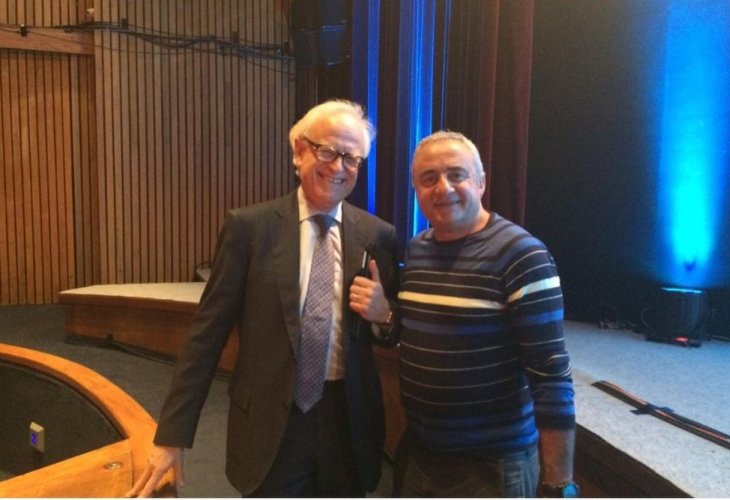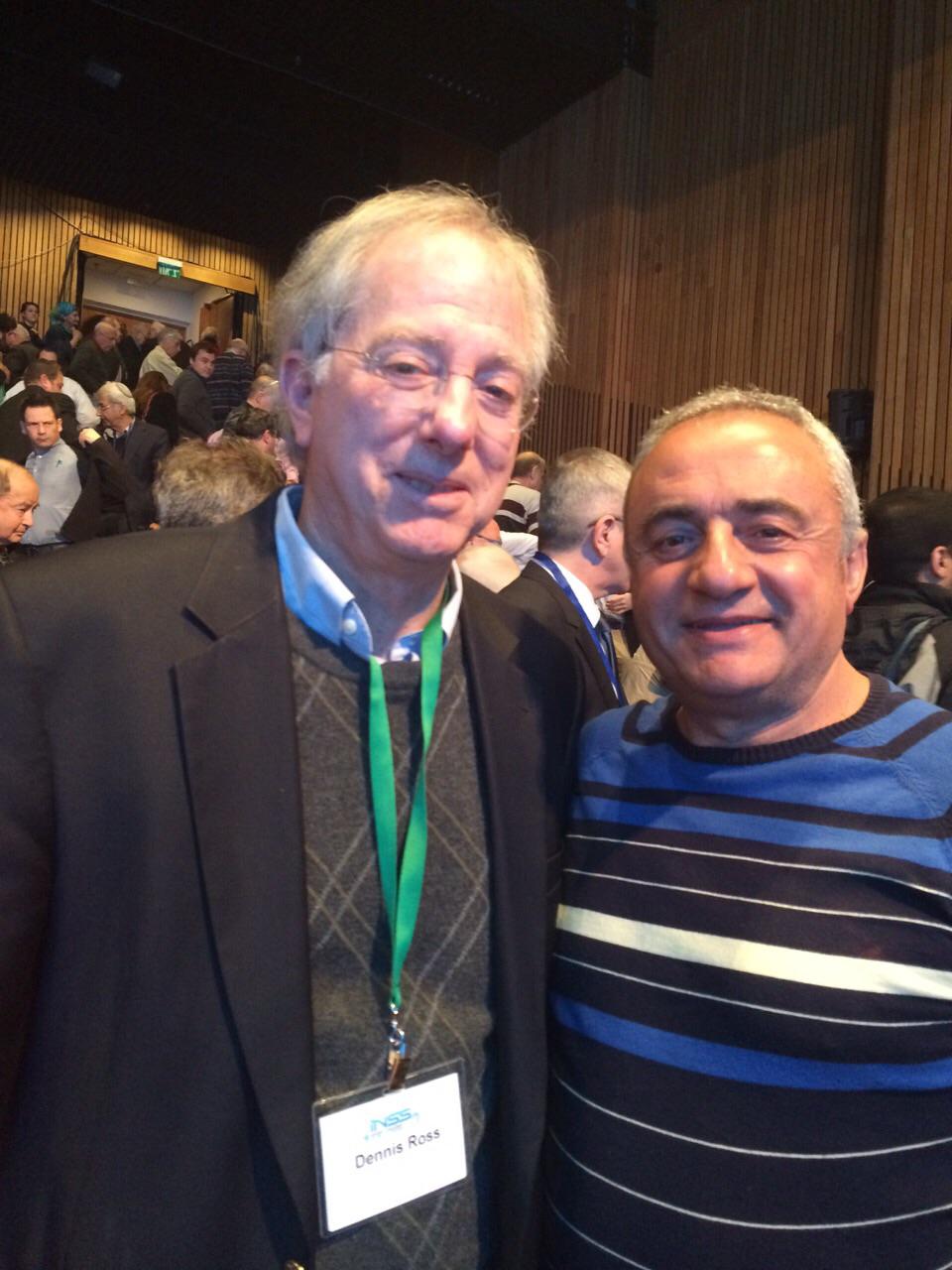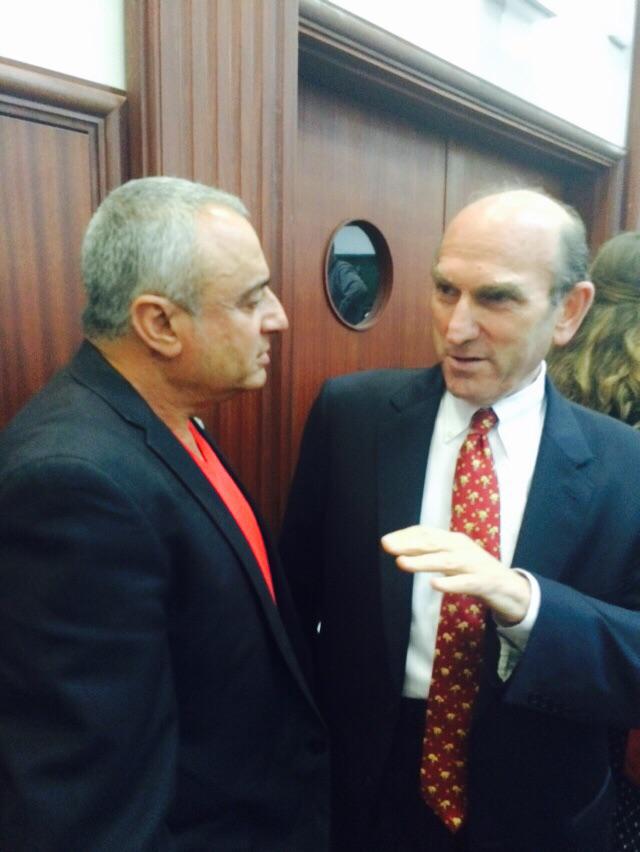"30 Years in Prison, 7 in Solitary": The Hardships and Trials of Pollard, In an Interview with His Release Campaign Chief
After 35 years, Effi Lahav, head of the campaign for Pollard's release, speaks about everything. Criticizes Pollard's severe sentence, recounts the global journey across the political spectrum, discusses the media's alienation from Pollard, and talks about Pollard himself, who clung to every shred of hope even while imprisoned.
 (Photo: Effi Lahav)
(Photo: Effi Lahav)"Today, Esther cut the electronic bracelet off my arm (authorized by the authorities), thereby restoring my almost complete freedom. The final step to freedom is our return home, to the land and people we love," with these dramatic words, former prisoner Jonathan Pollard, moved the people of Israel waiting for his return.
Almost every child knows the phrase "We want Pollard home," and when he was finally released, all of Israel was emotional and felt part of this pivotal moment. The settlement of Beit El has already offered him a place to live, and numerous politicians rushed to congratulate him. However, what today seems like an Israeli-American consensus was 15 years ago a neglected issue, left off the agenda, with many feeling repulsed by the affair.
The restrictive conditions under which Pollard lived since his release from prison made life very difficult. They included, among other things, a ban on leaving New York City, confinement to house arrest in the evenings and nights, and a requirement to wear an electronic bracelet at all times. Additionally, he was forbidden from interacting with the media, and his computers were monitored.
For Effi Lahav, the words "Pollard is free from all restrictions" are like a dream coming true after 15 years of worldwide effort. After the U.S. Department of Justice confirmed Pollard's final release and that he could move to Israel, Pollard's release campaign chief talks about everything, criticizing the harshest sentence Pollard received, recounting the global journey across the political spectrum, and hoping that Pollard starts a new life here in Israel.
Lahav's acquaintance with Pollard's painful issue began when he was chief of staff to then-Justice Minister Tzachi Hanegbi (Likud). During cabinet discussions, he learned about the issue, realized it concealed a major crime by the American judicial system, and began activities he was skeptical would extend to the world's other side.
"We gathered a group of people, good and ethical, who saw eye to eye the great injustice happening before us. Worst of all: no one said a word, tweeted, requested, or pleaded. Simply nothing. A person is rotting in prison for Israel, and everyone is silent.
"Meanwhile, additional figures began actions for Pollard's release. In January 1988, 23 Knesset members signed a petition to U.S. President Ronald Reagan, requesting Pollard's release on humanitarian grounds. On Reagan's successor's inauguration day, George Herbert Walker Bush, as U.S. President, the Knesset plenary approved a resolution stating: 'The Knesset calls upon President Bush to release Mrs. Anne Pollard from prison due to her health condition and to grant the Pollards clemency on humanitarian grounds.' Over the ensuing years, numerous Knesset members signed petitions for Pollard's release.
 (Photo: Effi Lahav)
(Photo: Effi Lahav)The Surprising Sentence Pollard Received
"Pollard suffered an injustice," declares Lahav. "The sentence he received surprised many, as the prosecution did not demand such a severe penalty, and the heaviest sentence ever given in the U.S. for spying for a friendly country was 14 years. Even more severe spies, who spied to harm the United States, did not receive such heavy and long-term sentences. Pollard spied for a friendly country, and his actions did not harm America's interests. He didn’t do it for financial gain. This excessive and painful sentence is a stain on the American judicial system.
"At that time, we realized Israel made a mistake. We understood Pollard broke American law, but he paid his debt to society. We decided, 'where there is no man,' we would be pioneers. We would carry the banner of awareness, remove the gloves, and address this incredibly sensitive issue on one hand, but so painful on the other. We felt a duty to do something.
"We began to develop strategy, set up an awareness campaign, and especially start with ground work." If anyone thought that the media, supposed to be objective, was interested in his release, Lahav surprises: "Most of the work was explaining the story to the media from the right perspective. During those days, they even thought we were just bizarre. 'You're bizarre, why bother with this settler spy?' one of the senior media figures once told me.
Lahav revolts when he hears such absurd claims: "Is there any doubt the information he provided to Israel was essential to our country?! Did the information not serve all the citizens of the state?! Of course, it did. Slowly, we permeated the understanding that we left one of our soldiers behind, and we reached points of impact."
Step by step, Lahav earned the trust of the Pollards and, for years, served as a bridge between the Knesset, the media, and politicians in Israel and the American government, congress, and Pollard's lawyers. In his activities, Lahav met the aides of American presidents over generations, administration heads, and the prosecution. From Martin Indyk, U.S. Ambassador to Israel, James Woolsey, Head of the CIA, to politicians in the Israeli Knesset, including Arab factions.
Explaining to American Jews involved significant challenges. Many years ago, much of the Jewish community believed Pollard deserved such a severe punishment. "In fact," Lahav explains, "they simply got caught in a personal dilemma where, on one side, is their homeland, the United States, and their unqualified loyalty to it. And on the other side is their origin – the Jewish People and the State of Israel, to which they belong in spirit. Therefore, in that area too, we worked with sensitivity on one hand and persistence on the other. So, his support base for release kept growing significantly."
Where did you encounter resistance?
"Where not? There's a senior Israeli who told me: 'Effi, you're dreaming, remember the Americans want to get Pollard out of U.S. gates in a coffin.' No more, no less. But we believed all along that, even when someone breaks the law and pays by spending 30 years in prison, including 7 years in solitary, that's enough. The man must be freed and let out. There’s no law and no reason for him to rot in prison." After years of struggle, Lahav can say today: "In the end, we were right, and others were wrong."
"In all the applications for early release filed by Pollard's lawyers, somehow, at the last moment, the Americans remembered to bring newly concocted intelligence just so Pollard wouldn’t be released. Regardless of the world having evolved information-wise, what was right 30 years ago isn’t relevant today. But all this did not help, and they clung to the utterly illogical claim that Pollard still poses a security threat to the U.S.," says Lahav with sorrow.
"Even the U.S. Deputy Defense Secretary during Pollard's trial, Lawrence Korb, clarified that Pollard was never charged with treason and that the punishment given to him was beyond what he deserved. Korb also confirmed that the severe accusations attributed to Pollard were actually committed by other American agents captured later who admitted to it.
"Moreover," reveals Lahav, "even Pollard's lawyers, who have high-security clearance enabling access to classified materials, were not allowed by the American system to obtain the necessary material to prove that, as they say, he doesn’t pose a security risk."
In June 2011, Prof. Morris Pollard, Jonathan's father, terminally ill, passed away. Public figures and Israeli Knesset members' calls, and an official request from the Israeli government to the White House, to allow Pollard to be with his father in his final moments and attend the funeral were not answered. After the funeral, the heads of the presidents' conference issued a statement expressing "shock and sorrow" over the decision not to allow Pollard to attend his father's funeral and called for immediate action for his release.
Did you feel particular difficulties under President Obama?
"No doubt, as many felt here in Israel, we also experienced deep disappointment that an administration declaring itself moral and objective showed callousness towards clemency requests and early release. We expected more, and it's a shame they acted like that."
 (Photo: Effi Lahav)
(Photo: Effi Lahav)Faith in Hashem, Love for the Land and its People
Have you met him?
"Yes. I met him in Butner Prison in North Carolina. Initially, Pollard served his sentence in Marion Prison, Illinois. At the time, the prison was considered the most secure among federal penitentiaries. Inmates spent nearly all day isolated in their cells. After about seven years, he was transferred to Butner Prison in North Carolina.
"It was one of the most fascinating meetings. The prison entry involved passing through seven gates with huge locks; one gate would not open until the previous was closed. At every moment, we were accompanied by two agents: one from the U.S. Bureau of Prisons and one from the FBI, with everything recorded, documented, and logged. The conversation mainly pertained to humanitarian matters and his greatest dream: to pack up his belongings and move to Israel. He was very optimistic and had a combative spirit for his release, saying 'We are still fighting to come home, and with Hashem's will, we'll get there,' he told me, despite the hope seeming far at that time.
"Even after he was released, we remained in contact. I spoke with him on the phone; he thanked me for all the support and asked for just one thing: to lower the profile. Because that was the right thing to do at that time. The less exposure, the less his name would appear in headlines, preventing the Americans from renewing restrictions due to good behavior.
Did he feel hurt by Israel?
"I won’t answer you directly; I'll say that in the early years of our activity, Israel didn’t know how to handle this story, how to relate to the affair. There was no clear, coherent voice in either direction. From that, understand what Pollard should feel being imprisoned," says Lahav.
Pollard himself said the following to Channel 12's U.S. correspondent, Yona Leibzon: "The government's indifference regarding bringing us home was crushing were it not for knowing that our faith in Hashem and our love for the land and its people is so strong that it will eventually lead us home. If not for my faith in Hashem, I would be very depressed right now."
Last Shabbat, when the U.S. Department of Justice was supposed to publish the decision on whether to request the continuation of his restrictions, Lahav was extremely tense. "On one hand, we wholeheartedly believed, and we had good indications, that they wouldn’t request the restrictions again. On the other hand, several instances had us hoping he’d be released soon, but at the last second, the release slipped through.
And how do you feel now?
"It's a feeling of elation. We always believed this would happen, but as the saying goes, 'It ain’t over till it's over.' Over the years of our activity, there were ups and downs. For years, we felt like hitting a wall, unable to break through the American indifference. I am pleased the American legal system understood there's no reason to continue holding him. Thank Hashem we can view this story as past and thank Hashem and the wonderful people who stood by us and him over all these years."
And most importantly: "For Pollard to heal from the time he was imprisoned mentally and physically. Our hope and prayer is for rest and contentment to come to the spirits and souls of Jonathan and his wife Esther who stood by him with true bravery for so many years—and finally, start a new life in the Holy Land."
Lahav also has a personal request from the people of Israel: "I ask to welcome Pollard to Israel with restraint. We have no interest in harming the good relations prevailing between the two countries, especially at this time when relations between Israel and the U.S. are reaching new heights. As far as I'm concerned, I ask everyone to celebrate privately, maintain maximum restraint, and refrain from provocations."

